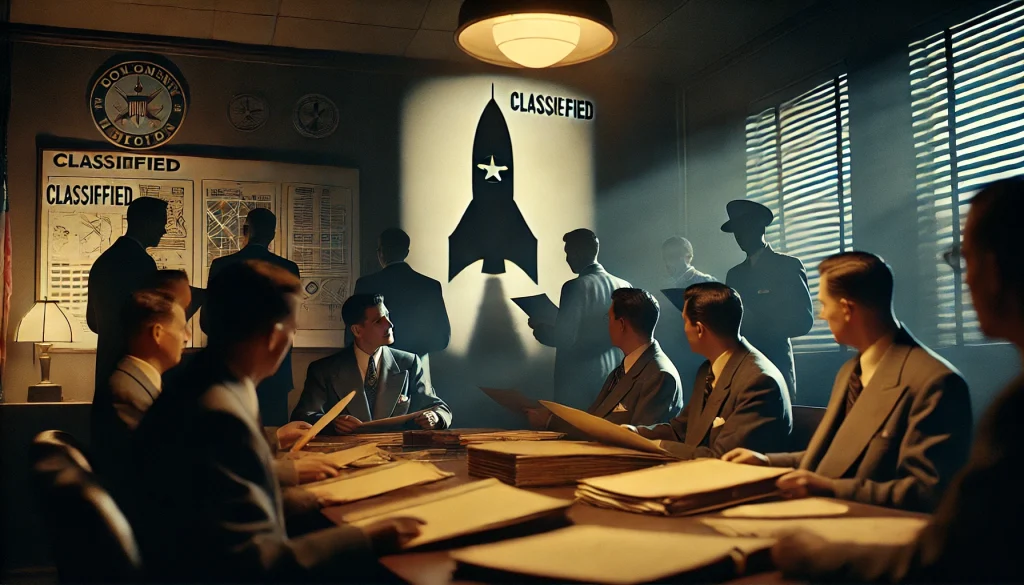Operation Paperclip was a covert U.S. government program that recruited over 1,600 German scientists, engineers, and technicians after World War II. Its aim was to leverage German expertise for U.S. military and technological advancements, especially in the Cold War competition with the Soviet Union. However, the program prioritized strategic gains over morality, shielding individuals deeply complicit in Nazi atrocities and war crimes. This stark compromise remains one of the darkest stains on America’s post-war history.
Background and Objectives
After Germany’s defeat in 1945, the United States and the Soviet Union raced to capture the intellectual assets of Nazi Germany. The U.S. government initiated Operation Paperclip to recruit German scientists specializing in rocketry, aeronautics, chemical weapons, and other advanced fields. Many of these individuals were not just professionals but active participants in the Nazi war machine. Despite their involvement in atrocities, the U.S. granted them sanctuary and opportunities to work, sanitizing their records to bypass legal and ethical barriers.

Key Figures and Their Crimes
1. Wernher von Braun
- Role in Nazi Germany: Lead scientist of the V-2 rocket program.
Crimes: - Relied on forced labor from concentration camp prisoners at Mittelbau-Dora.
- Thousands of laborers died due to inhumane conditions, malnutrition, and executions under his program.
- Role in the U.S.: Became a leading figure in NASA and contributed to the Apollo moon landing.
2. Arthur Rudolph
- Role in Nazi Germany: Operations director at the Mittelwerk factory producing V-2 rockets.
Crimes: - Directly oversaw forced labor in brutal conditions, causing thousands of deaths.
- Role in the U.S.: Worked on NASA’s Saturn V rocket program. Left the U.S. in 1984 due to accusations of war crimes.
3. Hubertus Strughold
- Role in Nazi Germany: Director of the Luftwaffe’s Institute for Aviation Medicine.
Crimes: - Implicated in medical experiments on concentration camp inmates, including freezing and high-altitude tests that resulted in deaths.
- Role in the U.S.: Contributed to aerospace medicine advancements despite his tainted past.
4. Kurt Blome
- Role in Nazi Germany: Deputy Reich Health Leader and head of biological warfare research.
Crimes: - Conducted lethal experiments involving plague and anthrax on prisoners.
- Role in the U.S.: Worked on U.S. biological warfare programs despite his Nazi affiliations.
5. Otto Ambros
- Role in Nazi Germany: Chemist and director at IG Farben, producer of Zyklon B used in gas chambers.
Crimes: - Managed Auschwitz’s synthetic rubber plant, exploiting forced laborers under appalling conditions.
- Convicted of slavery and mass murder at the Nuremberg Trials but later released and employed in U.S. research.
6. Walter Dornberger
- Role in Nazi Germany: Head of the V-2 rocket program.
Crimes: - Oversaw production dependent on concentration camp labor, leading to extensive deaths and suffering.
- Role in the U.S.: Worked with the U.S. Air Force and aerospace industries.

Controversies and Ethical Failures
- Complicity in Atrocities: Many scientists recruited through Operation Paperclip were directly involved in war crimes, including forced labor and inhumane medical experiments. Their work contributed to the suffering and deaths of thousands.
- Evasion of Justice: The U.S. government deliberately concealed the Nazi affiliations of these individuals, sanitizing their records to circumvent immigration laws and public scrutiny.
- Secrecy and Deception: The true extent of these individuals’ complicity in Nazi crimes was hidden from the public for decades, preventing accountability and transparency.
- Moral Sacrifices for Strategic Gain: By prioritizing scientific advancement and Cold War strategy, the U.S. overlooked the brutal histories of these individuals, effectively rewarding perpetrators of heinous crimes.
Legacy of Operation Paperclip
Operation Paperclip undeniably advanced U.S. military and space capabilities, including significant contributions to the Apollo moon landing and missile programs. However, these achievements came at a devastating moral cost. The program shielded perpetrators of unspeakable atrocities, undermining the principles of justice and accountability.
This program serves as a grim reminder of the ethical compromises governments are willing to make in the pursuit of power. While it contributed to scientific progress, Operation Paperclip also exemplifies the dangers of valuing strategic gains over humanity and justice.

